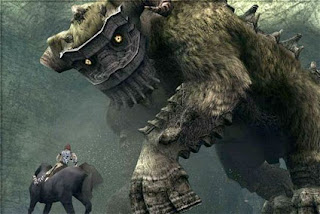I'm really, really tired of the debate about whether or not games are art. I have heard every possible argument possible from every side of the debate, and I will not listen to anymore of it. If you love games and have seen their power of telling stories and evoking powerful emotional responses, you understand that games absolutely have the ability to be forms of artistic expression. That discussion should have a bullet in it's skull by now, and the fact that gamers are still discussing it proves we are still unsure of our medium, and we personally aren't sure if we are good enough to be art, which is a destructive mindset.
Since I will never discuss that topic on THIS blog, I feel there are other topics related to the advancement of fascinating and artistic games that need to be discussed; there are problems surrounding video games as an industry that need to be solved. In this post, I'm going to cover two of these questions, and I hope you think about them, as well.
Is The System Weighed Against Creative Game Development?
What is "the system", you ask? Some may classify it as publishers, and the mainstream game market. I find that a little close-minded, and it doesn't really cover the whole problem. After all, publishers are just companies that exist to make money. They follow markets and bet on what they feel will succeed in the current market. No, "the system" may very well be you, and it is definitely is me at times. The things we buy contribute to "the system", subscribing to news organizations that parrot corporate lines contributes to it, etc.
You may think the statement that much of the industry is weighed against creativity is a little dramatic, and if I did not see the lineup for games releasing this year I may agree with you. But think about this: What games have you been most excited for this past year? Now list all of the sequels that appeared on your list. Don't get me wrong, I enjoy having more of a great game as much as any gamer- but it seems the video game industry is more occupied on doing more of the same than doing something new. We don't seem to want to leave our comfort zone, and because of that we consistently get more of the same. And then when a game at least attempts something different, or tries to change video games- it is labeled as pretentious because, well, it wasn't fun, or some crap like that.
"The system" rewards people doing the same thing over and over because it says, "That weird game isn't how video games are supposed to be." "Games have to be FUN or else they have failed as a game." It's one thing to criticize a game fairly, it's another entirely to look down upon the game because the people behind the game are trying something new, and calling them pretentious because they aren't staying with the status quo.
Are The Personalities We Like in The Game Industry Dragging It Down?
I will admit that I really like Jim Sterling, the writer of Destructoid.com. Not only do I find his humor ridiculously funny (some of my favorite podcast moments are Jim Sterling going insane on Podtoid in British voices) and I appreciate his harsh criticism of gaming, and his apparent longing for games to become the best they possibly can be. Yet, Jim is very guilty of trying to limit games as a form as well. He has made it very clear of his disdain for "art" games, complaining that they aren't fun, like games have to be fun before anything else.
Now, it's fine to have different opinions than me. That's what makes the world awesome, there are so many great and fascinating opinions floating around on any topic, and there are people like Jim Sterling who are great at fluently expressing and explaining these opinions. But I find the idea that games have to be fun one of the most destructive of any concept in the industry. It's like saying a novel must have intrigue or else it has failed, it's like saying that a rock album has to have heavy electric guitar riffs or else it is worthless. There is so much possibility in interactive media that saying games have to be fun is ridiculous and limiting.
Yet, people eat up these people's opinions like they are going to give them pundit-superpowers or something. How could non-gamers accept games on the same level as books or paintings when so many people in the middle of the industry feel they need to be toys. I am sorry, but I DO CARE that people accept games- I want more people to be interested in something as awesome as games because I know if we got over this "games are toys" hump, everyone would realize that games are amazing, as I already have.
I have said my piece, and put forward some pressing questions about trends that are harming the future of imaginative games. I now hope you will disagree or agree with me, and expand this discussion beyond being a one-sided affair. We won't get anywhere in this medium unless these questions are asked, and I am eternally grateful for the internet as a place for asking them. Game on, guys.







No comments:
Post a Comment